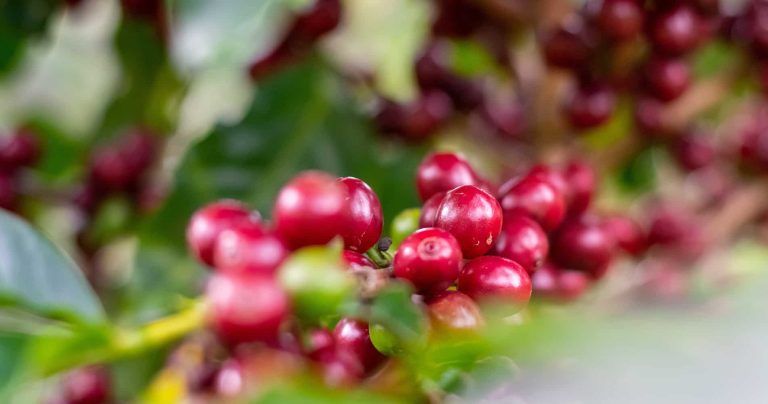3 Coffee Myths Unpacked by a Coffee Pro
Jess | August 24, 2020

There are so many myths about coffee out there. We took a moment to chat with our resident Specialty Coffee Association Trainer, Scott Barnes, to separate the fact from the fiction.
In our blog, Scott helps to unpack the top three myths around coffee quality. So whether you and your colleagues are budding coffee drinkers or seasoned coffee connoisseurs, you’ll be sure to know your beans by the end of it.
Which coffee myths do you often get asked about?
Scott: Well, there are loads of misconceptions about coffee but there are three that I get asked about most often. These tend to be around coffee quality. They include the provenance, the varieties and the blend of coffee that attracts such confusion. These three categories seem to have become synonymous with quality, but it’s a lot more complicated than that! I try and explain it in the same way one might think about wine. Even though these three interrelated factors are marketed as signs of quality, it’s not quite as straightforward as that.
PROVENANCE
Is Colombian coffee the best around?
Scott: Well, many people believe that Colombian coffee is the best and will recognise this specified place of origin as a gold stamp of quality. Somehow ‘Colombian’ has become a byword for quality. However, if you consider that coffee is grown in numerous regions between the Tropic of Cancer and Tropic of Capricorn, you’ll find thousands of different tastes and aromas.
Coffees from different locations often have distinct taste profiles. So in Africa for example, an Ethiopian coffee would likely be complex, acidic and fruity. A Rwandan coffee would give off floral and fresh taste notes. Or moving across to South America, a Brazilian coffee will be more mellow, less acidic, and often with a hint of chocolate.
It’s not only the origin country you have to consider. Other elements also impact the taste and quality, like the terroir (covering aspects such the soil quality, air humidity etc), what time of year the coffee was harvested. Also the storage, processing and roasting methods, and the way the coffee is brewed. There are so many variables. Plus it’s worth remembering that whatever the region, you’re always going to get some lower quality coffee alongside any high-grade premium beans.
So really what I’d say is no Colombian isn’t the ‘best’. Regardless of where your coffee is from, it comes down to personal taste. My go-to coffee is always a Guatemala Antigua but that’s not to say it’s the best around. It’s just my favourite to kick start my working day. Coffee is made to be enjoyed so there’s no wrong or right, just do whatever makes you happy!
VARIETAL
Do 100% Arabica coffee beans make a better brew?
Scott: Before I answer that, here are some coffee facts to think about and give that question some context. There are two major coffee varietals. Caffe Arabica and Caffe Canephora (also known as Robusta). These two varietals make up over 99% of the world’s coffee grown, although there are thousands and thousands of varietals. Liberica is another species but makes up less than 1% of world production. There are approximately 125 varieties of coffee used commercially.
Arabica and Robusta have very different profiles. Where Arabica will typically give a more fruity, floral, more acidic taste, a Robusta will usually be more bitter, earthy and bolder.
Arabica tends to be more expensive as it’s harder to grow and also yields less, so naturally, it costs more. This has meant it’s become synonymous with quality over the years but the higher price isn’t necessarily a marker of quality.
It also depends on how you’re using it. Robusta gives more body and crema to an espresso through a coffee machine. Arabica gives deeper flavour and floral notes making it ideal for filter coffee. Therefore I would say that a blend of the two varietals will give you the best of both worlds. This will brew a rounded cup of flavourful coffee that everyone in the office will love.
COFFEE BLENDS
People who really love coffee prefer single-origin, don’t they?
Scott: Again, this comes down to personal preference, and what sort of coffee experience you’re looking for. Many coffee brands use blends and in some of the major brands, you might find at least seven different origins in there. Big coffee brands love blends because consumers often look for a consistent coffee experience. This is exactly what a blend provides – reliable, consistently good coffee.
Blends also give you a reasonable price point making them more affordable. Single-origin coffees can be quite pricey, which often makes them prohibitive for office use. They can also prove challenging to get hold of. For example, your favourite single-origin coffee is only grown in small batches and picked at a certain time of year. And if a crop unfortunately fails, you won’t get any at all, so that’s where the consistency of a blend comes in again. So no, I’m officially debunking this myth!
The perfect coffee for your office
In order to keep your team happy, hydrated and productive and to keep your business running smoothly, you need a good quality coffee that will help to do that. Before choosing what office coffee to opt for, think about what you want your coffee to say about your business. Rewarding employees with high quality, premium-grade coffee shows them you care, and will create a better impression on your clients, guests and suppliers.
Get in touch
Got a coffee-related question? We’d love to hear it! Our expert team is on hand to help you make the best decisions based on your individual office coffee requirements. Simply give us a call on 020 7553 7900 or email us at hello@freshground.co.uk.
Reference https://foodfornet.com/worlds-best-coffee-regions-flavor-profiles/